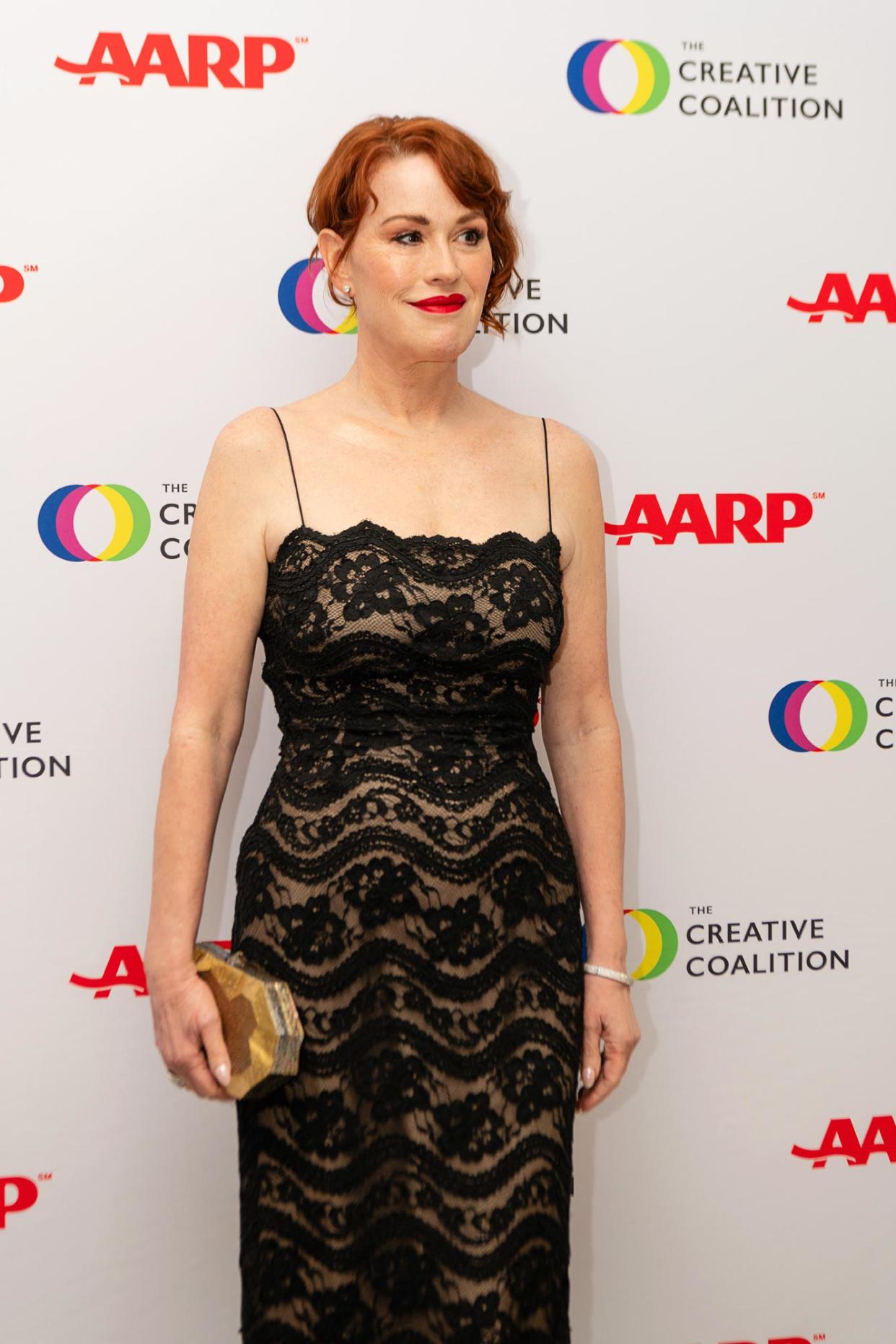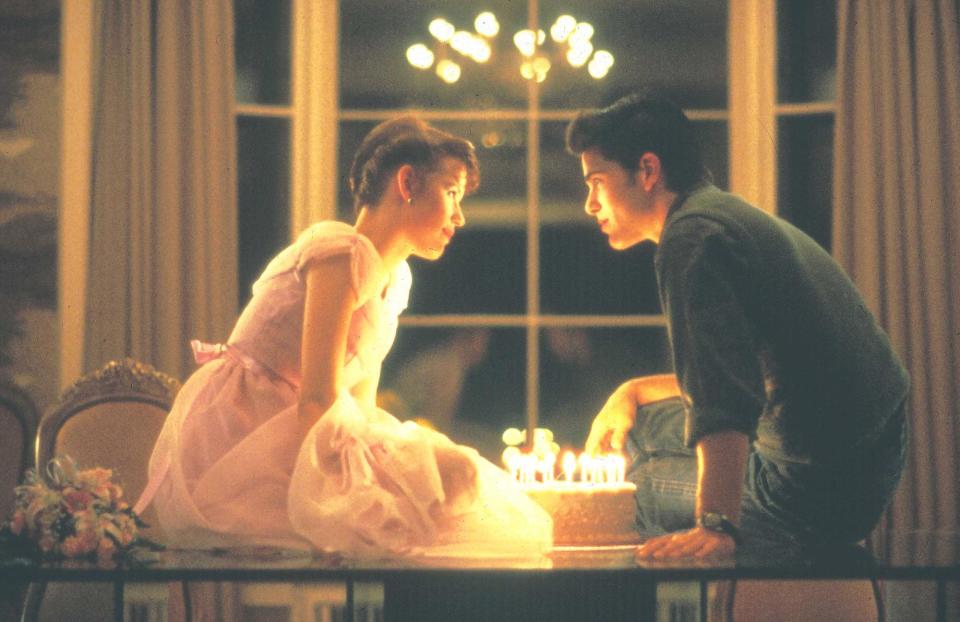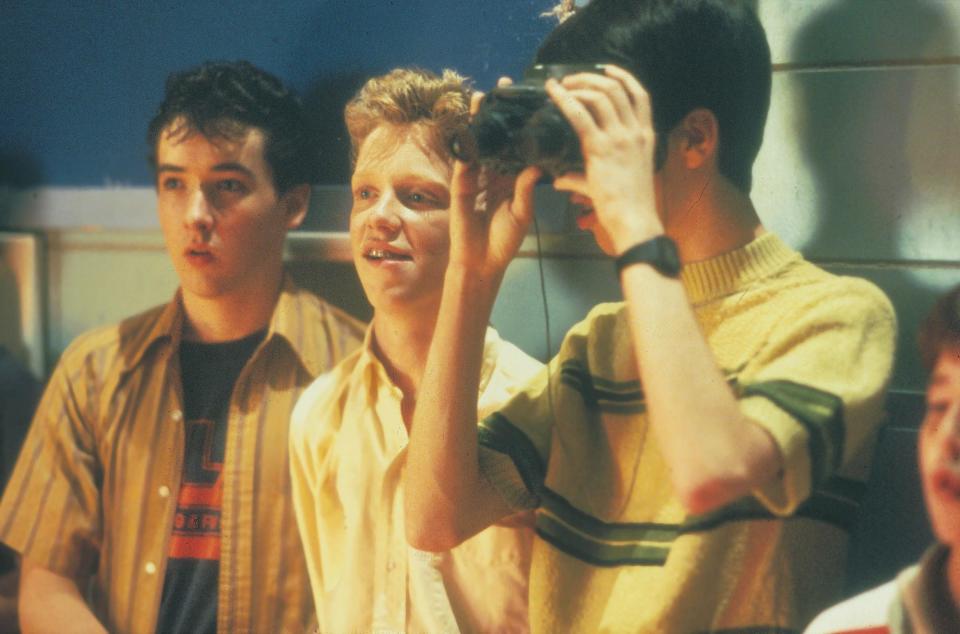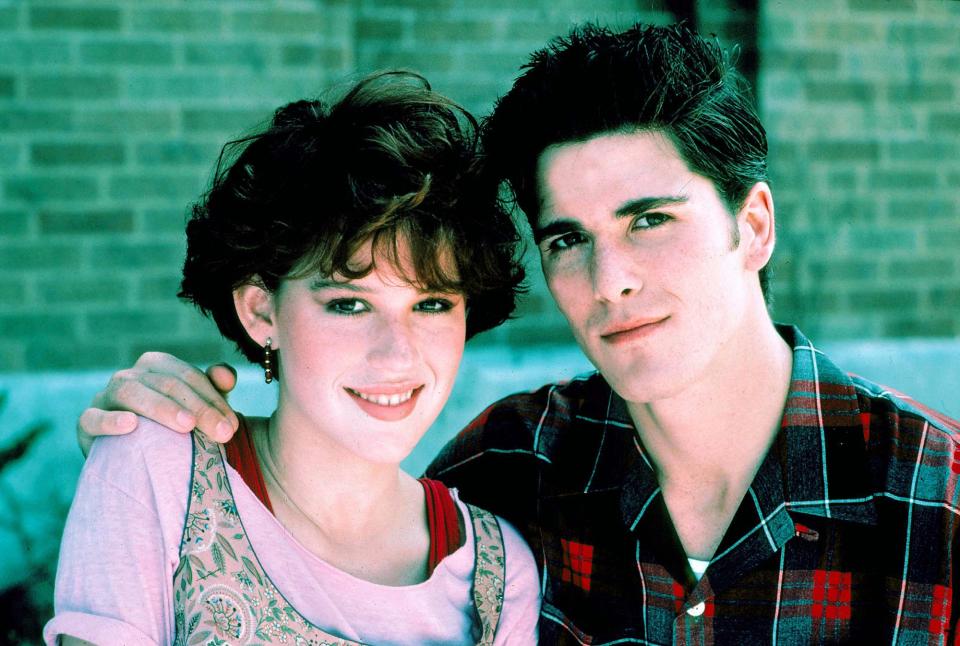Molly Ringwald’s Honest Quotes About Making Peace With the Problematic Nature of ‘Sixteen Candles’

- Oops!Something went wrong.Please try again later.
- Oops!Something went wrong.Please try again later.
- Oops!Something went wrong.Please try again later.
Forty years after its release, Sixteen Candles has an undeniable place in the pantheon of American comedies. The box-office smash has remained a staple in the coming-of-age genre, even if its legacy has become clouded in recent years.
The film, written and directed by John Hughes, received rave reviews from renowned critics like Roger Ebert and Gene Siskel at the time of its release, but even then, it faced criticism for its offensive stereotypes.
Molly Ringwald starred as Sam Baker, a teenager with a crush on senior Jake Ryan (Michael Schoeffling) and with parents who forgot her 16th birthday. Meanwhile, freshman Ted, a.k.a. The Geek (Anthony Michael Hall), has eyes for Sam, and foreign exchange student Long Duk Dong (Gedde Watanabe) is staying at her house, forcing her to sleep on the sofa.
In the years since its release, Ringwald has come to terms with both the good and bad aspects of a movie she can now watch with her children. Keep reading for everything she has said about Sixteen Candles and its complicated legacy:
A Guide to the Brat Pack: The Actors That Ruled the ’80s, From Rob Lowe to Molly Ringwald
‘These Movies Are Very White’

Speaking at the Miami Film Festival in April 2024, Ringwald weighed in on how a remake of Hughes hits like Sixteen Candles, The Breakfast Club and Pretty in Pink would have to differ from their originals — in a word, diversity.
"Those movies are very white and they don't really represent what it is to be a teenager in a school in America today,” Ringwald said.
It was announced in 2022 that Selena Gomez was developing a half-hour sitcom titled Fifteen Candles, loosely based on Sixteen Candles, but following a group of Latina teens as quinceañera season approached. Ringwald praised the idea, preferring that to a straight-up reboot.
“I am so happy about that. I really do feel like when people always ask me about rebooting my movies, I am like, ‘No, those movies were wonderful,’ but what they should do is take inspiration from them and do something completely different but inspired, so that just sounds fantastic,” she told Deadline.
‘Sixteen Candles’ Cast: Where Are They Now? Molly Ringwald, Anthony Michael Hall and More
Times Are Different
Amid talk of the allegations against Supreme Court Justice Brett Kavanaugh during his 2018 confirmation hearing, Ringwald opened up about how times have changed since she filmed those movies with Hughes and weighed in on the good and the bad.
“Everyone says and I do believe [it’s] true, that times were different and what was acceptable then is definitely not acceptable now and nor should it have been then, but that’s sort of the way that it was,” she told NPR. “I feel very differently about the movies now, and it’s a difficult position for me to be in because there’s a lot that I like about them.”
“And of course I don’t want to appear ungrateful to John Hughes, she added, “but I do oppose a lot of what is in those movies.”
Watching With Her Daughter

Ringwald shares daughter Mathilda and fraternal twins Adele and Roman with husband Panio Gianopolous. In 2018, she disclosed that she watched her films with Mathilda, which inspired her to write an essay in The New Yorker looking back on them. She has not yet watched them with Adele, who she said “is the most woke individual that you've ever met.”
In the NPR interview, Ringwald talked about how watching with Mathilda changed how she sees her movies.
“I do see it differently,” she said. “I mean, there were parts of that film that bothered me then. Although everybody likes to say that I had, you know, John Hughes' ear and he did listen to me in a lot of ways, I wasn't the filmmaker. And, you know, sometimes I would tell him, ‘Well, I think that this is kind of tacky’ or ‘I think that this is irrelevant’ or ‘this doesn't ring true,’ and sometimes he would listen to me but in other cases he didn't. And, you know, you don't want to speak up too much. You don't want to cross the line. Or at least that's the way that I felt at the time.”
Ringwald added in a 2021 interview with Andy Cohen that watching her movies with Mathilda “was such an emotional experience that I haven’t — I haven’t found that strength to watch it with my two other kids.”
‘It’s Not Funny. It’s Creepy.’
Even at the time, some elements of Sixteen Candles were too problematic to include in the final cut. In her essay for The New Yorker, Ringwald recalled a moment where her character’s father was supposed to ask, “Sam, what the hell happened to your underpants?”
Ringwald wrote, “My mom objected. ‘Why would a father know what happened to his daughter’s underwear?’ she asked. John squirmed uncomfortably. He didn’t mean it that way, he said — it was just a joke, a punch line. ‘But it’s not funny,’ my mother said. ‘It’s creepy.’ The line was changed to ‘Just remember, Sam, you wear the pants in the family.’”
The Date Rape Scene

One of the most problematic scenes in Sixteen Candles comes when Jake offers up his drunk girlfriend, Caroline (Haviland Morris), to The Geek in exchange for Sam’s underwear. The Geek then takes photos of Caroline, and the two wake up the next day in bed together.
“Thinking about that scene, I became curious how the actress who played Caroline, Haviland Morris, felt about the character she portrayed,” Ringwald said in The New Yorker in 2018. “So I sent her an email. We hadn’t seen or spoken to each other since she was 23 and I was 15. We met for coffee, and after we had filled each other in on all the intervening years, I asked her about it. Haviland, I was surprised to learn, does not have the same issues with the scene as I do.”
She continued, “In her mind, Caroline bears some responsibility for what happens, because of how drunk she gets at the party. ‘I’m not saying that it’s OK to then be raped or to have nonconsensual sex,’ Haviland clarified. ‘But . . . that’s not a one-way street. Here’s a girl who gets herself so bombed that she doesn’t even know what’s going on.’”
‘The Breakfast Club’ Cast: Where Are They Now? Molly Ringwald, Ally Sheedy and More
Long Duk Dong
Ringwald doesn’t dance around the problematic nature of Long Duk Dong, the Chinese foreign exchange student in Sixteen Candles. Even a New York Times review written shortly after the movie’s release called the character “unfunny" and a "potentially offensive stereotype."
Naturally, Ringwald agrees.
“The character of Long Duk Dong, in Sixteen Candles, is a grotesque stereotype, as other writers have detailed far more eloquently than I could,” she wrote in The New Yorker.
She Doesn’t Want the Movies ‘Erased’
Despite her criticism, Ringwald feels that Sixteen Candles and her other movies with Hughes have their place in history.
“I feel like that’s what makes the movies really wonderful, and it’s also something I wanted to go on record talking about — the elements that I find troubling and that I want to change for the future,” she told Cohen. “But that doesn’t mean at all that I want them to be erased. I’m proud of those movies, and I have a lot of affection for them. They’re so much a part of me.”
Ringwald also noted that marginalized groups that Hughes’ comedies targeted were often not represented at all in films in the 1980s.
“There’s elements of these films that I find homophobic. On the other hand, they’re also about people that felt like outsiders,” she said. “So they speak to a lot of people who feel — you know, they’re complicated.”

